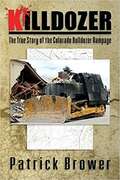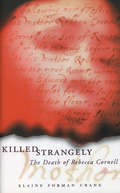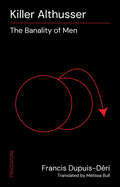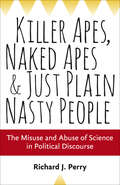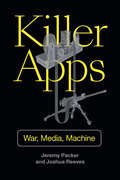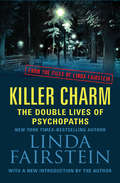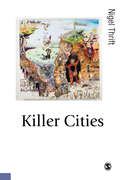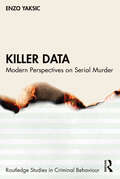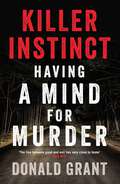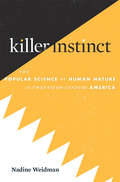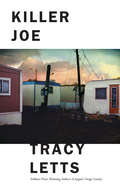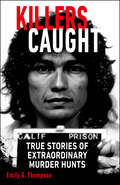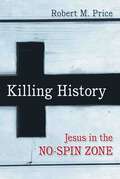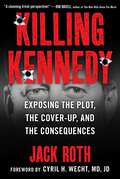- Table View
- List View
Killdozer: The True Story Of The Colorado Bulldozer Rampage
by Patrick BrowerOn June 4, 2004, Marvin Heeymeyer unleashed his gigantic, armored, tank-like bulldozer upon the small town of Granby, Colorado. It was an act of defiant, but misguided, revenge upon those who he perceived had done him wrong in a long series of local property disputes. Over a period of serveral hours, Heemeyer proceeded to cause mayhem and destruction while overwhelming the efforts of local police to stop the Killdozer in its tracks. This book recounts the events and actions of the perpetrator leading up to the dramatic rampage as well as the aftermath of the horrendous incident in the community.
Killed Strangely: The Death of Rebecca Cornell
by Elaine Forman Crane"It was Rebecca's son, Thomas, who first realized the victim's identity. His eyes were drawn to the victim's head, and aided by the flickering light of a candle, he 'clapt his hands and cryed out, Oh Lord, it is my mother.' James Moills, a servant of Cornell . . . described Rebecca 'lying on the floore, with fire about Her, from her Lower parts neare to the Armepits.' He recognized her only 'by her shoes.'"--from Killed Strangely On a winter's evening in 1673, tragedy descended on the respectable Rhode Island household of Thomas Cornell. His 73-year-old mother, Rebecca, was found close to her bedroom's large fireplace, dead and badly burned. The legal owner of the Cornells' hundred acres along Narragansett Bay, Rebecca shared her home with Thomas and his family, a servant, and a lodger. A coroner's panel initially declared her death "an Unhappie Accident," but before summer arrived, a dark web of events--rumors of domestic abuse, allusions to witchcraft, even the testimony of Rebecca's ghost through her brother--resulted in Thomas's trial for matricide. Such were the ambiguities of the case that others would be tried for the murder as well. Rebecca is a direct ancestor of Cornell University's founder, Ezra Cornell. Elaine Forman Crane tells the compelling story of Rebecca's death and its aftermath, vividly depicting the world in which she lived. That world included a legal system where jurors were expected to be familiar with the defendant and case before the trial even began. Rebecca's strange death was an event of cataclysmic proportions, affecting not only her own community, but neighboring towns as well. The documents from Thomas's trial provide a rare glimpse into seventeenth-century life. Crane writes, "Instead of the harmony and respect that sermon literature, laws, and a hierarchical/patriarchal society attempted to impose, evidence illustrates filial insolence, generational conflict, disrespect toward the elderly, power plays between mother-in-law and daughter-in-law, [and] adult dependence on (and resentment of) aging parents who clung to purse strings." Yet even at a distance of more than three hundred years, Rebecca Cornell's story is poignantly familiar. Her complaints of domestic abuse, Crane says, went largely unheeded by friends and neighbors until, at last, their complacency was shattered by her terrible death.
Killer Althusser: The Banality of Men
by Francis Dupuis-DériOn November 16, 1980, the Marxist philosopher Louis Althusser strangled his wife in their Parisian apartment, in a period when she was thinking of leaving him. What do we know about Hélène Legotien today? Almost nothing, except that she was murdered by her illustrious spouse. In a sense, Althusser killed her twice, first, by his own hands and second, by dominating the public space to talk about himself. What then is the political significance of this femicide and the discourse about it which has taken shape in the public space? Delving into the writings of the murderer and his allies in the French intelligentsia, Killer Althusser reasserts the patriarchal violence of the murder, masculine solidarity, and the complacency of a cultural elite.
Killer Apes, Naked Apes, and Just Plain Nasty People: The Misuse and Abuse of Science in Political Discourse
by Richard J. PerryMisunderstood—or deliberately twisted—biological science leads to overheated rhetoric and bad policy.We like to think that science always illuminates. But the disturbing persistence of the concept of biological determinism—the false idea that human behavior is genetically fixed or inherently programmed and therefore is not susceptible to rapid change—shows that scientific research and concepts can be distorted to advance an inhumane and sometimes deadly political agenda. It was biological determinism that formed the basis of the theory of eugenics, which in turn led to the forced sterilization of "misfits" and the creation of Nazi death camps.In Killer Apes, Naked Apes, and Just Plain Nasty People, anthropologist Richard J. Perry delivers a scathing critique of determinism. Exploring the historical context and enduring popularity of the movement over the past century and a half, he debunks the facile and the reductionist thinking of so many popularizers of biological determinism while considering why biological explanations have resonated in ways that serve to justify deeply conservative points of view.Moving through time, from the prevalence of overt racism in the late nineteenth and early twentieth centuries to "human nature" arguments, from the rise of sociobiology in the 1970s to the current fixation on evolutionary psychology, the book argues that both history and cross-cultural studies amply demonstrate the human capacity for growth and self-determination. Clearly written, conversational, and rationally argued, this book promotes sound and careful research while skewering the bogus ideological assertions that have been used to justify colonialism, slavery, gender discrimination, neoliberal economic policies, and the general status quo.
Killer Apps: War, Media, Machine
by Jeremy Packer Joshua ReevesIn Killer Apps Jeremy Packer and Joshua Reeves provide a detailed account of the rise of automation in warfare, showing how media systems are central to building weapons systems with artificial intelligence in order to more efficiently select and eliminate military targets. Drawing on the insights of a wide range of political and media theorists, Packer and Reeves develop a new theory for understanding how the intersection of media and military strategy drives today's AI arms race. They address the use of media to search for enemies in their analyses of the history of automated radar systems, the search for extraterrestrial life, and the development of military climate science, which treats the changing earth as an enemy. As the authors demonstrate, contemporary military strategy demands perfect communication in an evolving battlespace that is increasingly inhospitable to human frailties, necessitating humans' replacement by advanced robotics, machine intelligence, and media systems.
Killer Charm: And Other True Cases (From the Files of Linda Fairstein #7)
by Linda FairsteinThe complete collection of true crime stories and articles by the New York Times–bestselling author and former prosecutor. In this collection of horrifyingly true stories, Linda Fairstein provides an in-depth look inside the minds of such psychopaths as Ted Bundy and the Craigslist Killer. Drawing on decades of experience as a sex crimes prosecutor in New York City, she delves into the atrocities of these cold-blooded criminals and explains how they target their unsuspecting victims. A true victim advocate, she deftly touches on taboo subjects like law enforcement&’s astounding failure to process rape kits, as well as the false rape claims that ruin innocent people&’s lives. With her background in the Special Victims Bureau, Fairstein offers an unfiltered view of rape in the United States. But she doesn&’t stop there: She uses her understanding of the inner workings of violent criminals&’ minds to outline ways for women to protect themselves. Originally published in Cosmopolitan magazine and collected here for the first time, each essay features a new introduction by the author.
Killer Charm: The Double Lives of Psychopaths (From the Files of Linda Fairstein #1)
by Linda FairsteinLinda Fairstein unmasks the true face of psychopathy, and reveals the warning signs that every woman should knowThe 2009 &“Craigslist Killer&” murder case shocked America, not just because of the heinous nature of the crimes but because their perpetrator—a handsome young law student with an unsuspecting girlfriend—seemed a very unlikely suspect. This killer, like others before him, had learned to leverage his charm and golden-boy looks to lure his victims, a skill many psychopaths learn to master. In Killer Charm, legal expert Linda Fairstein draws on her decades of experience in the Manhattan District Attorney&’s office to uncover what traits psychopaths often share, and how to spot them. She illustrates these points with the stories of some of America&’s most notorious sex criminals, such as Ted Bundy and Marvin Teicher. Originally published in Cosmopolitan, this essay is now available in digital format for the first time and features a new introduction by the author.
Killer Cities (Published in association with Theory, Culture & Society)
by Nigel ThriftKiller Cities uses a combination of social theory, polemic and close attention to empirical detail to tell the story of how and why cities cause mass animal death and, in the process, hasten the destruction of the planet. This book is not just a lament, however. It is an attempt to navigate out of this mess of planned and unplanned violence towards a world in which cities no longer act as killers but become aligned with the lives of other beings. It offers pragmatic ways of diminishing the death toll and changing mindsets without ever minimizing the dilemmas that inevitably will have to be faced. Killer cities can be rehabilitated so that they offer brighter paths towards the future - for animals, for human beings, and for the planet. A new urban geography could be within our grasp. Indeed, it has to be, for all of our sakes.
Killer Cities (Published in association with Theory, Culture & Society)
by Nigel ThriftKiller Cities uses a combination of social theory, polemic and close attention to empirical detail to tell the story of how and why cities cause mass animal death and, in the process, hasten the destruction of the planet. This book is not just a lament, however. It is an attempt to navigate out of this mess of planned and unplanned violence towards a world in which cities no longer act as killers but become aligned with the lives of other beings. It offers pragmatic ways of diminishing the death toll and changing mindsets without ever minimizing the dilemmas that inevitably will have to be faced. Killer cities can be rehabilitated so that they offer brighter paths towards the future - for animals, for human beings, and for the planet. A new urban geography could be within our grasp. Indeed, it has to be, for all of our sakes.
Killer Cocktails: Dangerous Drinks Inspired by History's Most Nefarious Criminals
by Maria Trimarchi Holly FreyFrom the hosts of the criminally popular podcast Criminalia, Holly Frey and Maria Trimarchi, a dangerously delicious cocktail and mocktail book inspired by history&’s most notorious (and notoriously overlooked) criminals Every month, over 200,000 listeners download Criminalia to hear stories of history&’s wildest and most devious criminals they never knew existed. But this isn't just any true-crime podcast—more than an engaging history lesson, Criminalia also offers a cocktail recipe to go with each criminal. After all, what pairs better with the story of an identity-shifting murderess who burned her house down to cover up a crime… than a fiery jalapeño cocktail? In KILLER COCKTAILS, Criminalia cohosts Holly Frey and Maria Trimarchi offer readers a cornucopia of creative and out-of-the-box cocktail and mocktail recipes, inspired by some of the wildest, weirdest, and most bizarre crimes throughout history. Written with their signature wit and humor, KILLER COCKTAILS gives us dozens of recipes, many of which fans have never seen before, expertly paired with its historical dastardly villain. From brutish bodysnatchers and comely conwomen, to poisonous chemists, nefarious mystics, and even a pirate queen, this book is perfect for anyone who loves a juicy, bloody story and a creative concoction. History and true crime lovers, cocktail and mocktail enthusiasts, and anyone looking for the perfect gift for their off-beat friend will find much to savor in this wickedly fun book. Brimming with stranger-than-fiction stories and recipes that are equally thought-provoking and tasty, KILLER COCKTAILS is a double-shot of morbid fun—and will satisfy all your darkest cravings for years to come.
Killer Dad
by Robert ScottA devoutly religious husband and father is revealed as a murderous sex addict in this true crime case featured on 48 Hours Mystery. In November of 2001, Colorado family man Michael Blagg called 911 in distress over his missing wife and six-year-old daughter, exclaiming &“Oh my god . . . there&’s blood all over!&” But frantic search parties and Michael's anguished pleas on national television came up empty. Then the investigation stumbled across Blagg&’s dark side. A devout born-again Christian, Blagg was addicted to Internet porn. He also reportedly abused his wife and indulged in the services of hired escorts. Then in June 2002, nearly a year after her disappearance, his wife's mummified remains were found in a local landfill. And Michael quickly left town. Extradited from Georgia, Blagg was charged with first-degree murder. But the explosive trial was rocked by even more bizarre revelations, stunning twists, and an unspeakable mystery that haunted the country: What made Blagg do it? And, even more disturbing, whatever happened to little Abby? Includes sixteen pages of shocking photos
Killer Data: Modern Perspectives on Serial Murder (Routledge Studies in Criminal Behaviour)
by Enzo YaksicKiller Data examines the phenomenon of serial murder using data collected from international sources to review offender patterning with a focus on contemporary cases. This type of attention will allow for a broader understanding of modern-day serial murderers and will help to dispel some of the myths that surround offenders. The current serial murder classification scheme incorrectly types serial murderers as supremely intelligent killing machines while discounting their socialization, experiences, and choices. This book exposes serial murderers as run-of-the-mill hometown losers, who brutalize women, and are lucky to escape apprehension. Like other atypical homicide offenders, modern-day serial murderers are propelled forward by a deep sense of entitlement, easy access to firearms, and a nonchalant attitude toward using murder to attain their goals. Readers should come away with a deeper understanding not of the ultra-rare or the "deadliest" serial murderers but of the more common offenders who pose a consistent threat to day-to-day life. The book utilizes the Consolidated Serial Homicide Offender Database, one of the largest and most robust open access databases of multiple murders available, presenting new thinking on areas such as: myths and stereotypes the impact of entertainment on the perception of serial murder inaccurate prevalence estimates spree/serial hybrid offenders the classification of two and three victim serial murderers how serial murderers pursue longevity the characteristics of aspiring serial murderers whether hit men and gang members are serial murderers if and why serial murder is in a state of decline how many serial murderers are responsible for the homicides that sent innocent people to prison luck as a factor of “success” for serial murderers. These findings are illustrated with 200 narrative vignettes of serial murder series that occurred between 2011 and 2021, such as Itzcoatl Ocampo, Charles Severance, Nikko Jenkins, and Pamela Hupp, offenders who may be unfamiliar to many but represent the next iteration of the serial murderer. Correcting decades of flawed assumptions about serial murderers, and written in an accessible and concise style, Killer Data is essential reading for students and scholars of criminal justice and criminology, law enforcement professionals, and the interested general reader.
Killer Instinct: Having a mind for murder
by Donald GrantForensic psychiatrist Donald Grant asks, what is it about murder that fascinates us? Is it the chill whisper of fear reminding us we too can kill? Grant describes ten true murder cases, each with unique triggers. For most of us, murder is an arm's length experience, close enough to frighten and fascinate yet far enough not to traumatise. For those directly affected, murder can be scarring. Our restless chatter about murder, our state of heightened alert, our endless appetite for news, may all just be play therapy, reassuring us that our own killer instincts are under control.
Killer Instinct: The Popular Science of Human Nature in Twentieth-Century America
by Nadine WeidmanA historian of science examines key public debates about the fundamental nature of humans to ask why a polarized discourse about nature versus nurture became so entrenched in the popular sciences of animal and human behavior. Are humans innately aggressive or innately cooperative? In the 1960s, bestselling books enthralled American readers with the startling claim that humans possessed an instinct for violence inherited from primate ancestors. Critics responded that humans were inherently loving and altruistic. The resulting debate—fiercely contested and highly public—left a lasting impression on the popular science discourse surrounding what it means to be human. Killer Instinct traces how Konrad Lorenz, Robert Ardrey, and their followers drew on the sciences of animal behavior and paleoanthropology to argue that the aggression instinct drove human evolutionary progress. Their message, spread throughout popular media, brought pointed ripostes. Led by the anthropologist Ashley Montagu, opponents presented a rival vision of human nature, equally based in biological evidence, that humans possessed inborn drives toward love and cooperation. Over the course of the debate, however, each side accused the other of holding an extremist position: that behavior was either determined entirely by genes or shaped solely by environment. Nadine Weidman shows that what started as a dispute over the innate tendencies of animals and humans transformed into an opposition between nature and nurture. This polarized formulation proved powerful. When E. O. Wilson introduced his sociobiology in 1975, he tried to rise above the oppositional terms of the aggression debate. But the controversy over Wilson’s work—led by critics like the feminist biologist Ruth Hubbard—was ultimately absorbed back into the nature-versus-nurture formulation. Killer Instinct explores what happens and what gets lost when polemics dominate discussions of the science of human nature.
Killer Joe
by Tracy Letts"One of our most valuable playwrights."-Time Out New York"A hideously funny tabloid noir. . . . Letts' balance of irony and empathy continues to impress."-LA WeeklyA definitively dysfunctional family gives in to its basest instincts and is forced to face hidden truths in this twisted modern-day fairy tale by the Pulitzer Prize-winning author of August: Osage County. Performed in fifteen countries and twelve languages since its 1998 stage debut, Killer Joe is "a terrifically tasty potboiler. . . . It has the enjoyable hairpin turns of the standard mystery thriller, but it's the skewed shifting relationships that keep you hooked" (The New York Times). Now a critically acclaimed film adapted by the playwright and starring Matthew McConaughey.Tracy Letts is the author of the Pulitzer Prize- and Tony Award-winning play August: Osage County (soon to be a feature film starring Meryl Streep and Julia Roberts). His other plays include Bug, Superior Donuts, and Man from Nebraska, a finalist for the Pulitzer Prize. He is an ensemble member of the Steppenwolf Theatre Company in Chicago as playwright and actor.
Killer Looks: The Forgotten History of Plastic Surgery in Prisons
by Zara StoneKiller Looks is the definitive story about the long-forgotten practice of providing free nose jobs, face-lifts, breast implants, and other physical alterations to prisoners, the idea being that by remodeling the face you remake the man. From the 1920s up to the mid-1990s, half a million prison inmates across America, Canada, and the U.K willingly went under the knife, their tab picked up by the government. In the beginning, this was a haphazard affair -- applied inconsistently and unfairly to inmates, but entering the 1960s, a movement to scientifically quantify the long-term effect of such programs took hold. And, strange as it may sound, the criminologists were right: recidivism rates plummeted. In 1967, a three-year cosmetic surgery program set on Rikers Island saw recidivism rates drop 36% for surgically altered offenders. The program, funded by a $240,000 grant from the Department of Health, Education, and Welfare, was led by Dr. Michael Lewin, who ran a similar program at Sing-Sing prison in 1953. Killer Looks draws on the intersectionality of socioeconomic success, racial bias, the prison industry complex and the fallacy of attractiveness to get to the heart of how appearance and societal approval creates self-worth, and uncovers deeper truths of beauty bias, inherited racism, effective recidivism programs, and inequality.,
Killer Weed
by Connie Carter Susan C. BoydSince the late 1990s, marijuana grow operations have been identified by media and others as a new and dangerous criminal activity of "epidemic" proportions. With Killer Weed, Susan C. Boyd and Connie Carter use their analysis of fifteen years of newspaper coverage to show how consensus about the dangerous people and practices associated with marijuana cultivation was created and disseminated by numerous spokespeople including police, RCMP, and the media in Canada. The authors focus on the context of media reports in Canada to show how claims about marijuana cultivation have intensified the perception that this activity poses "significant" dangers to public safety and thus is an appropriate target for Canada's war on drugs.Boyd and Carter carefully show how the media draw on the same spokespeople to tell the same story again and again, and how a limited number of messages has led to an expanding anti-drug campaign that uses not only police, but BC Hydro and local municipalities to crack down on drug production. Going beyond the newspapers, Killer Weed examines how legal, political, and civil initiatives that have emerged from the media narrative have troubling consequences for a shrinking Canadian civil society.
Killer on the Road: Violence and the American Interstate (Discovering America #2)
by Ginger StrandTrue crime meets cultural history in this story of how America&’s interstate highway system opened a world of mobility and opportunity . . .for serial killers.Starting in the 1950s, Americans eagerly built the planet&’s largest public work: the 42,795-mile National System of Interstate and Defense Highways. Before the concrete was dry on the new roads, however, a specter began haunting them: the highway killer. He went by many names: the &“Hitcher,&” the &“Freeway Killer,&” the &“Killer on the Road,&” the &“I-5 Strangler,&” and the &“Beltway Sniper.&” Some of these criminals were imagined, but many were real. The nation&’s murder rate shot up as its expressways were built. America became more violent and more mobile at the same time.Killer on the Road tells the entwined stories of America&’s highways and its highway killers. There&’s the hot-rodding juvenile delinquent who led the National Guard on a multistate manhunt; the wannabe highway patrolman who murdered hitchhiking coeds; the record promoter who preyed on &“ghetto kids&” in a city reshaped by freeways; the nondescript married man who stalked the interstates seeking women with car trouble; and the trucker who delivered death with his cargo. Thudding away behind these grisly crime sprees is the story of the interstates—how they were sold, how they were built, how they reshaped the nation—and how we came to equate them with violence.Through the stories of highway killers, we see how the &“killer on the road,&” like the train robber, the gangster, and the mobster, entered the cast of American outlaws, and how the freeway—conceived as a road to utopia—came to be feared as a highway to hell.&“Strand . . . Explores the connection between America&’s sprawling highway system and the pathology of the murderers who have made them a killing ground. . . . The grim stories of murder on the highway may do for road trips what Jaws did for surfing. An interesting detour into a true-crime niche.&” ―Kirkus Reviews&“Strand&’s cross-threaded tales of drifters, stranded motorists, and madmen got its hooks into me. Reading Ms. Strand&’s thoughtful book is like driving a Nash Rambler after midnight on a highway to hell.&” —Dwight Garner, The New York Times&“A titillating, clever volume that mixes the sweeping sociological assertions of an urban-studies textbook with the chilling gore of true-crime stories.&” —Bookforum&“Ginger Strand is in possession of a sharp eye, a biting wit, a beguiling sense of fun—and a magnificent obsession.&” —Bloomberg
Killer on the Road: Violence and the American Interstate (Discovering America #2)
by Ginger StrandStarting in the 1950s, Americans eagerly built the planet's largest public work: the 42,795-mile National System of Interstate and Defense Highways. Before the concrete was dry on the new roads, however, a specter began haunting them-the highway killer. He went by many names: the "Hitcher," the "Freeway Killer," the "Killer on the Road," the "I-5 Strangler," and the "Beltway Sniper. " Some of these criminals were imagined, but many were real. The nation's murder rate shot up as its expressways were built. America became more violent and more mobile at the same time. Killer on the Road tells the entwined stories of America's highways and its highway killers. There's the hot-rodding juvenile delinquent who led the National Guard on a multistate manhunt; the wannabe highway patrolman who murdered hitchhiking coeds; the record promoter who preyed on "ghetto kids" in a city reshaped by freeways; the nondescript married man who stalked the interstates seeking women with car trouble; and the trucker who delivered death with his cargo. Thudding away behind these grisly crime sprees is the story of the interstates-how they were sold, how they were built, how they reshaped the nation, and how we came to equate them with violence. Through the stories of highway killers, we see how the "killer on the road," like the train robber, the gangster, and the mobster, entered the cast of American outlaws, and how the freeway-conceived as a road to utopia-came to be feared as a highway to hell.
Killer: The Autobiography of a Mafia Hit Man (Adrenaline Classics Ser.)
by David Fisher Joey the Hit ManNew York Times Bestseller: This groundbreaking tell-all by a mob hit man is &“chilling and compelling—a must-read&” (Former FBI agent Joe Pistone, aka Donnie Brasco). The Bronx-born son of a Jewish bootlegger, &“Joey the Hit Man&” was introduced to crime when he was just eleven years old. For the next thirty years he was a numbers king, scalper, loan shark, enforcer, and drug smuggler. He hijacked trucks, fenced stolen goods, and trafficked in pornography. But Joey really made his name as a Mafia assassin, racking up thirty-eight cold-blooded hits—thirty-five for cash, three for revenge. In Killer, Joey tells the true story of life in organized crime. He exposes the reality of gang wars, discusses how he raised a family while living on the wrong side of the law, and documents the day-to-day business of crime—from making and breaking alliances to staying one step ahead of the cops. He reveals how he faced a grand jury seven times with no convictions (&“never lie to your lawyer&”) and kept a seven-figure fortune out of reach of the IRS. He lays out in graphic detail the difference between getting paid to kill and doing it for personal reasons. &“People think because they saw [The Godfather] they know everything there is to know about organized crime,&” Joey contends. In this no-holds-barred account, he reveals the brutal truth behind the Hollywood fantasy. Forty-five years after this true crime classic shocked readers all over the world and set the standard for bestselling Mafia biographies including Joseph Bonnano&’s A Man of Honor and Philip Carlo&’s Ice Man, the new edition of Killer includes an afterword by coauthor David Fisher that unmasks Joey&’s real identity—and the circumstances behind his death that add another layer of mystery to his complicated, colorful, and fascinating life.
Killers Caught: True Stories of Extraordinary Murder Hunts
by Emily G. ThompsonThey thought they had gotten away with murder. They were wrong.Discover the vital clues, the crucial evidence, the lucky breaks, the chases, the painstaking detective work, the unlikely heroes that led to the capture of serial killers such as &“The Good Nurse&” poisoner Charles Cullen, finally detected by a young colleague; Yorkshire Ripper Peter Sutcliffe, revealed by false license plates; Night Stalker Richard Ramirez, spotted by a 13-year-old boy; Hotelier of Death H. H. Holmes, apprehended selling his victims&’ skeletons…Killers Caught reveals the downfall of these ruthless individuals, as well as the stories of how many more of crime&’s most notorious and prolific murderers were brought to justice.
Killing Children in British Fiction: Thatcherism to Brexit
by Dominic DeanThis book stems from a simple yet disturbing observation: contemporary British fiction is full of children killing or being killed. Thoughtfully considering novels and films, alongside actual murder cases and moral panics, Dominic Dean develops this insight into a complex account of British cultural history, from the Thatcher to Brexit eras. Killing Children in British Fiction argues that the figure of the child provides means for negotiating, and hence for understanding, recent crises in Britain and their intersections with broader transnational conflicts. The book explores works from major British authors such as Kazuo Ishiguro, Ian McEwan, Doris Lessing, Sarah Waters, Alan Hollinghurst, and Peter Ackroyd; emerging writers such as David Szalay and Melissa Harrison; and filmmakers, including Stanley Kubrick, Nicholas Roeg, Robin Hardy, Derek Jarman, and Remi Weekes. Bridging and often challenging existing scholarship in childhood studies, literary studies, psychoanalysis, and critical and queer theory, Dean shows how the child, at once materially present and representative of an insecure future, can provoke relentless fantasies, fears, and, most troublingly, acts of real violence by adults.
Killing Civilization: A Reassessment of Early Urbanism and Its Consequences
by Justin JenningsThe concept of civilization has long been the basis for theories about how societies evolve. This provocative book challenges that concept. The author argues that a &“civilization bias&” shapes academic explanations of urbanization, colonization, state formation, and cultural horizons. Earlier theorists have criticized the concept, but according to Jennings the critics remain beholden to it as a way of making sense of a dizzying landscape of cultural variation. Relying on the idea of civilization, he suggests, holds back understanding of the development of complex societies.Killing Civilization uses case studies from across the modern and ancient world to develop a new model of incipient urbanism and its consequences, using excavation and survey data from Çatalhöyük, Cahokia, Harappa, Jenne-jeno, Tiahuanaco, and Monte Albán to create a more accurate picture of the turbulent social, political, and economic conditions in and around the earliest cities. The book will influence not just anthropology but all of the social sciences.
Killing History: Jesus In The No-Spin Zone
by Robert M. PriceKilling Jesus, the bestselling blockbuster by Bill O'Reilly, claims to be a purely historical account of the events in the life of Jesus leading up to his crucifixion. New Testament scholar Robert M. Price (a member of the Jesus Seminar) shows how unfounded this claim is in this critical review of O'Reilly's work. In fact, he judges the book to be the number one source of misinformation on Jesus today. Ignoring over one hundred years of New Testament scholarship, O'Reilly and his coauthor, Martin Dugard, have produced what Price describes as a Christian historical thriller that plays fast and loose with the facts. Price goes through the key events of Jesus' later life as described in the gospels and retold in Killing Jesus, painstakingly showing in each case what scholars know and don't know. Using humor, down-to-earth analogies, and witty sarcasm-not unlike O'Reilly's own interview style-Price makes it clear that O'Reilly's book is more historical novel than a work of serious history. By cobbling together the four gospel stories, ignoring the contradictions, and adding plenty of quasi-historical background embellishments, O'Reilly and Dugard have created a good narrative that resonates with a lot of Christians. Entertaining reading this may be, but history it is not. Killing History provides lay readers with an accessible introduction to New Testament scholarship while showing the many problems in O'Reilly's book.
Killing Kennedy: Exposing the Plot, the Cover-Up, and the Consequences
by Jack RothStartling new insights into the JFK assassination In Killing Kennedy: Exposing the Plot, the Cover-Up, and the Consequences, author Jack Roth interviews researchers, scholars, eyewitnesses, and family members of those who were part of the tangled web of US intelligence operations associated with the Cold War and the circumstances surrounding the assassination of John F. Kennedy. The author asks important questions, including why the assassination still matters today and what the lasting ripple effects have been since that fateful day. The Kennedy assassination represents one of the most impactful events in not only American but also world history, and this book represents an important addendum to understanding its enduring significance. On November 22, 1963, the duly elected president of the United States was murdered in cold blood, forever destroying &“Camelot&” and national optimism for world peace. Gleaning a &“people&’s history&” of the assassination through dozens of insightful and heartfelt interviews, Roth presents a riveting narrative by creating a respectful, well-crafted, and emotionally charged book from which both older and younger generations will gain a greater understanding of our nation&’s history and current status in the modern world.
